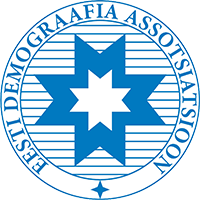-
EDA ja EDK AASTALÕPU ETTEKANDEKOOSOLEK
Eestlaste pere- ja sündimuskäitumine: Mida räägivad Soome registriandmed aastatest 1990-2020?
Ettekande teeb: EDK teadur Leen Rahnu
Aeg: 15.detsember 2022 kell 16:00
Koht: Tallinna Ülikooli Mare maja ruum M-552
View gallery -
EDA ja EDK ETTEKANDEKOOSOLEK
Vanemahüvitis ja sündimus
Tutvustatakse rahvastikuteaduse professor Allan Puuri ja doktorant Sanan Abdullayevi uurimistööd vanemahüvitise ja sündimuse seostest.
Ettekande teevad: rahvastikuteaduse professor Allan Puur
ja doktorant Sanan Abdullayev
Aeg: 09.november 2022 kell 16:00- 18:00
Koht: Tallinna Ülikool, Mare maja, M-648
-
EDA ja EDK ETTEKANDEKOOSOLEK
Revolutionary transition: Inheritance change and fertility decline
Ettekande teeb - Marc Goñi Trafah, Associate Professor in economics at the University of Bergen.
Aeg: 17.august 2022 kell 13:00 - 14:30
Koht: Tallinna Ülikool Mare maja, M-552
View gallery -
EDA ja EDK ETTEKANDEKOOSOLEK
EESTI -POOLA
demograafide II seminar
Who reach 105 years and survive above among Belgian oldest ?
Aeg: 10.mai 2022 kell 13:00
Koht: Tallinna Ülikool Mare maja, M-552
ZOOM
Ettekandjad:
Michel Poulain - TLÜ EDK vanemteadur, Louvaini ülikooli emeriitprofessor
Anne Herm - TLÜ EDK teadur
-
EDA ja EDK ETTEKANDEKOOSOLEK
EESTI -POOLA
demograafide I seminar
Social network effects on survival among middle-aged and older population
Ettekande teeb EDK teadur Liili ABULADZE
Aeg: 6.aprill 2022 kell 10:00
Koht: Tallinna Ülikool Mare maja, M-552
ZOOM
-
ANNUAL CONFERENCE 2022 of DGD
SAKSA DEMOGRAAFIA SELTSI (DGD) AASTAKONVERENTS 2022
"Demograafilised muutused Kesk- ja Ida-Euroopas - Demograafiline käitumine alates 1990.aastast."
16.03.2022 - 18.03.2022
10:30 - 11:20 Konverentsi avamine
DGD Opening - Prof. Dr. Gabriele Doblhammer, DGD president
Kurzpräsentationen der Partner / Short Presentations of Partners
o Charles University/ University of Economics, Prague
o Committee on Demographic Studies of the Polish Academy of Sciences/ Warsaw School of Economics
o Estonian Demographic Association/ Estonian Institute for Population Studies
o Hungarian Demographic Research Institut
12:15 - 13:45 S1 - Fertility in Central and Eastern Europe
Leen Rahnu, Allan Puur - Demographic integration of migrant population: the evidence from fertility and family change among Russian migrants in Estonia
15:00 - 16:30 S5 - (Social) determinants of health
Liili Abuladze, Luule Sakkeus - Everyday activity limitations, death and social networks of middle-aged and older Estonians
-
EDA ja EDK ETTEKANDEKOOSOLEK
Teatame kahetsusega, et esineja reisi ärajäämise tõttu lükatakse ettekandekoosolek edasi. Uus toimumise aeg teatatakse hiljem.
Social Background and the Demographic Life Course: Cross-National Comparisons
Ettekande teeb: Prof. dr. A.C. (Aart) Liefbroer
Professor of Demography of the Lifecourse at the University Medical Center Groningen
Professor of Demography of Young Adults and Intergenerational Transmission at the Faculty of Social Sciences, VU University Amsterdam
Member of the Royal Netherlands Academy of Arts and SciencesAeg : 10.märts 2022 kell 16:30Koht: Tallinna Ülikool, Mare maja, M-552Experiencing social disadvantage in childhood has important consequences for the demographic life course. For instance, it increases the risk for early childbirth, having children outside a stable partner relationship and experiencing divorce. However, some countries seem to do better in buffering these potentially negative consequences than others. In this presentation, I will present results from a large project that has studied these issues across European societies. I will be discussing the mechanisms linking social background and adult demographic behaviours and potential country-level factors that buffer the negative consequences of childhood disadvantage.
REGISTREERU hiljemalt 07.03.2022 SIIN

